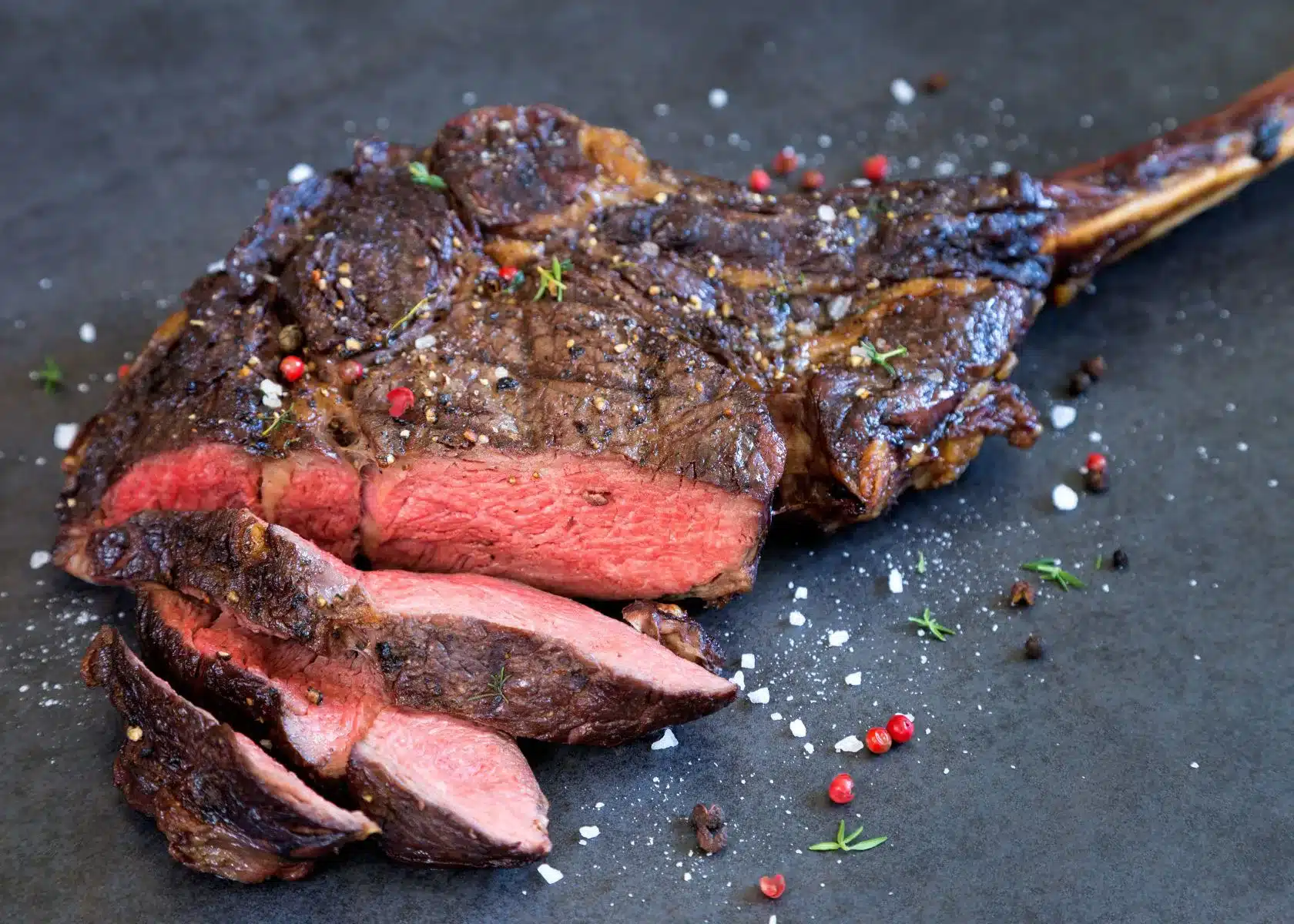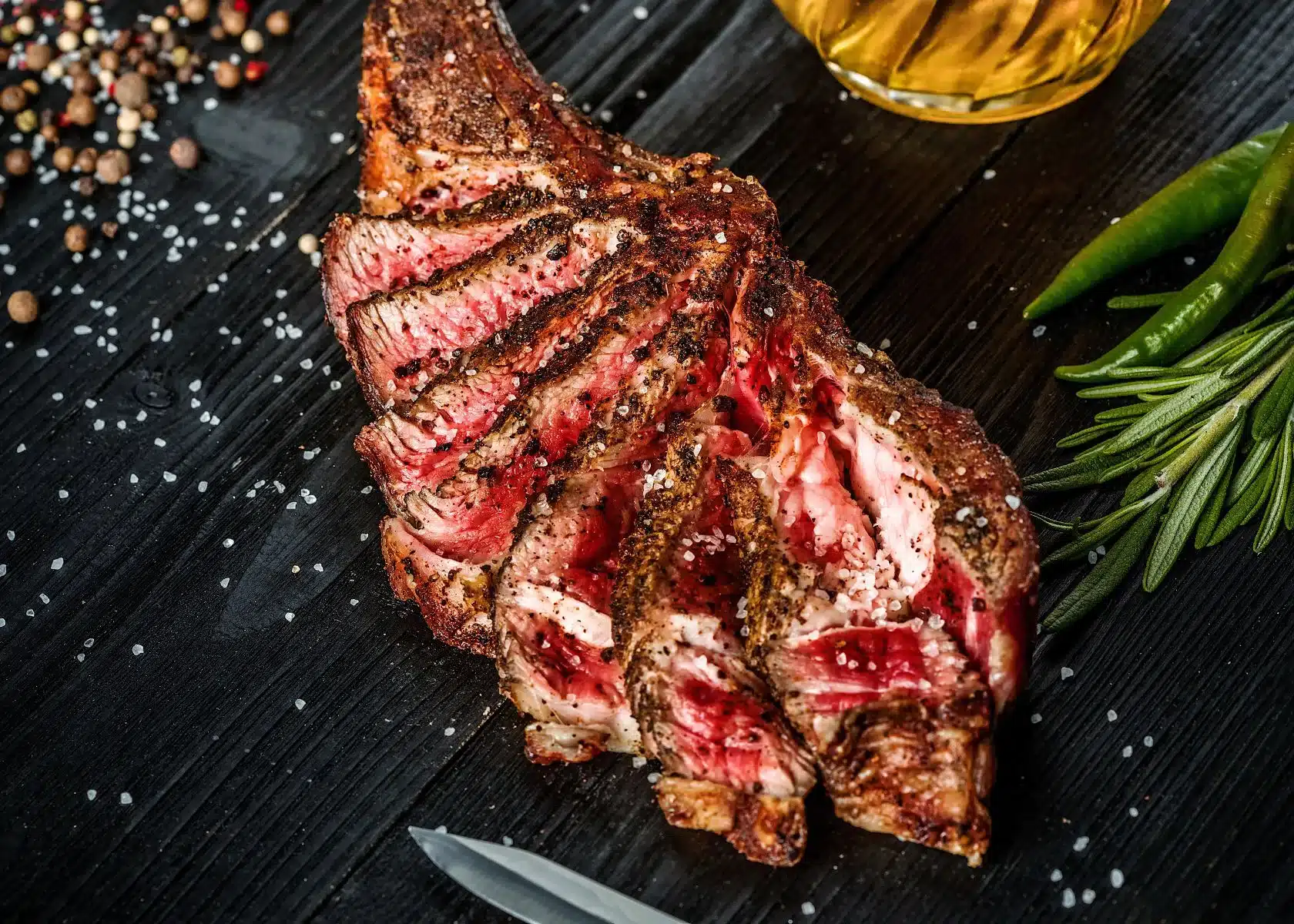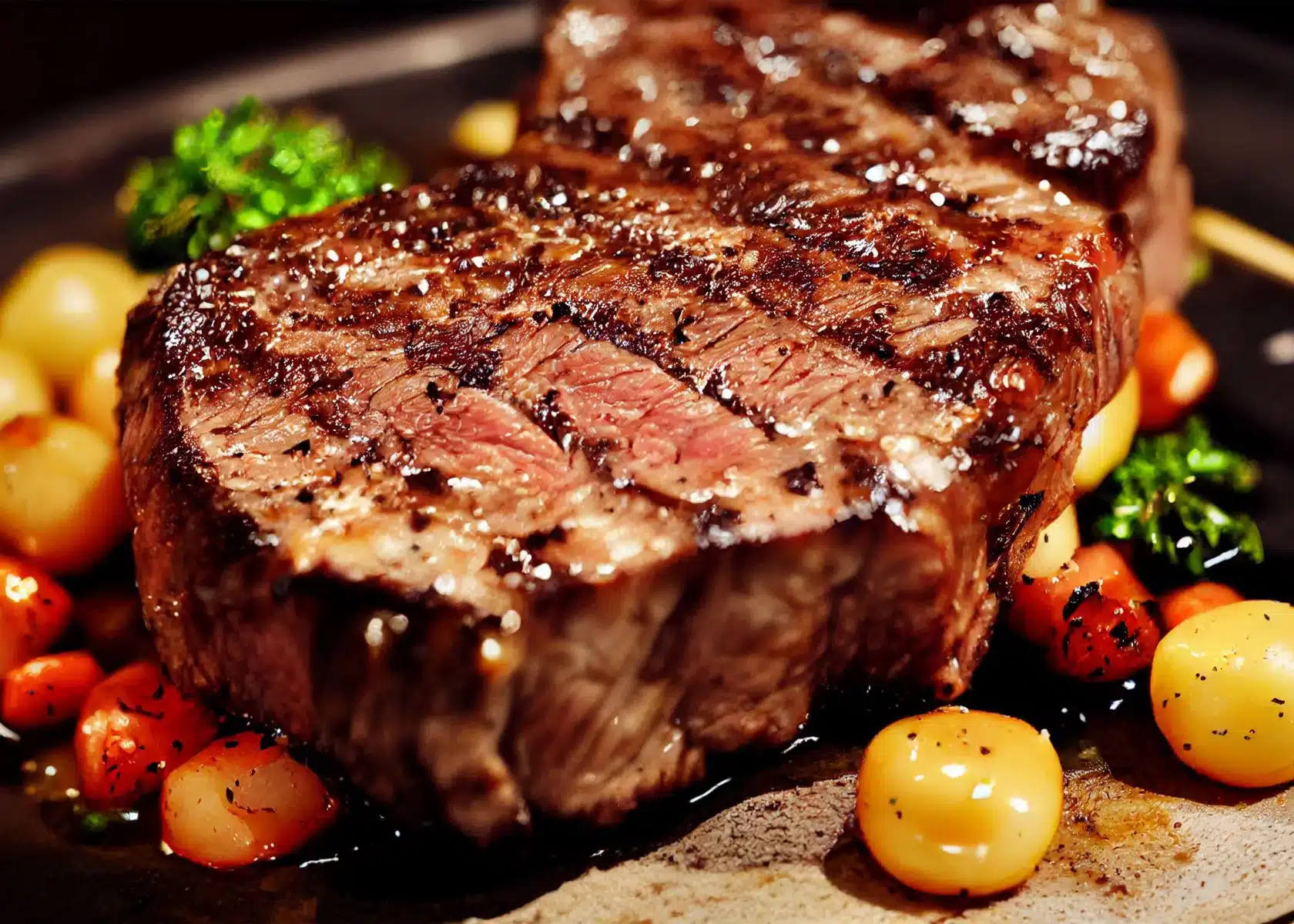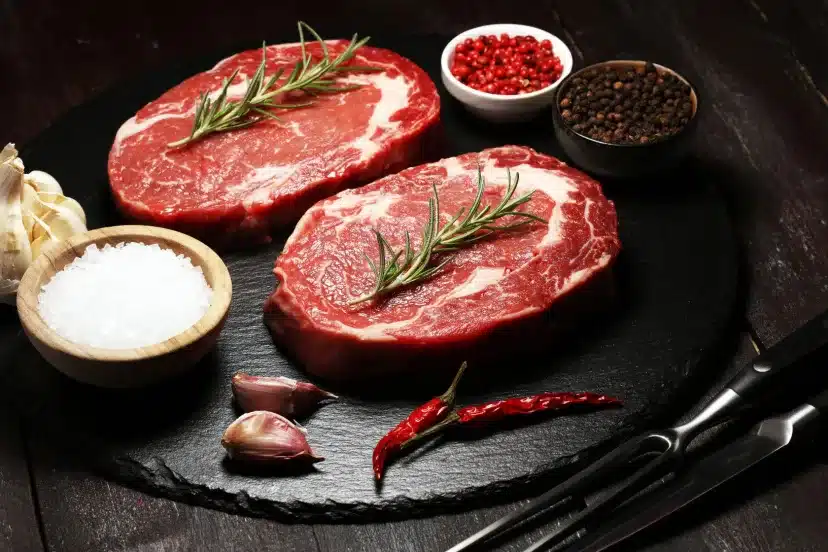How Long to Dry Brine Steak? How To Do It Properly?
Ever had that feeling of a slight letdown when your anticipated steak dinner falls short on flavor? Trust me, you’re not alone. After a few too many lackluster meals, I dove into the fascinating world of meat preparation and came across a game-changer: dry brining.
In this article, we’ll explore the ins and outs of dry brining together—what it is, how much time it requires, and most importantly, how to do it right for an unforgettable steak experience.
So buckle up; we’re about to upgrade those so-so steaks into tantalizingly tasty triumphs.
Table of Contents
Key Takeaways
- Dry brining involves coating a steak with salt and other spices, then letting it rest in the refrigerator for 45 minutes up to 48 hours.
- Dry brining enhances the flavor and texture of steak by locking in moisture and improving tenderness.
- The duration of dry brining can vary depending on personal preference, but it is recommended to let the steak climatize at room temperature for about 30 minutes before cooking.
Understanding Dry Brining

Dry brining is a method where you season your steak by rubbing it with salt and other spices, then letting it rest in the refrigerator for a certain period of time.
What Is Dry Brining?
Dry brining is a culinary technique that involves coating a steak, or any piece of meat for that matter, with salt and allowing it to rest. Steak preparation using dry brining can take anywhere from 45 minutes up to 48 hours.
This process works wonders by enhancing the flavor profile of your steak along with its texture. It helps lock in the moisture, which makes your steak juicy even after being cooked! Typically, the resting period happens inside a refrigerator, either covered or uncovered, depending on personal preference.
The end result? A succulent steak seeped with flavors throughout its fabric.
Dry Brine vs. Wet Brine
Wet brining and dry brining are two different techniques used to enhance the flavor and texture of steak. Dry brining involves sprinkling coarse salt directly onto the meat, allowing it to sit uncovered in the refrigerator for a period of time before cooking.
On the other hand, wet brining requires submerging the steak in a kosher salt or table salt solution for several hours.
Both methods have their advantages. Dry brining is quicker, taking only a few hours or up to 48 hours, depending on preference, while wet brining can take up to 24 hours. Dry brine allows the natural flavors of the meat to shine through, resulting in a more concentrated taste.
Wet brine, on the other hand, infuses the steak with moisture and additional flavors from herbs or spices added to the solution.
Benefits of Dry Brining
Dry brining offers several benefits when it comes to preparing steak. Firstly, it enhances the flavor of the meat, allowing the natural taste of the steak to shine through. Additionally, dry brining improves the texture of the steak, resulting in a more tender and juicy bite.
Moreover, dry brining helps to retain moisture during cooking, preventing the steak from drying out. Lastly, dry brining is a quick and convenient method that requires minimal effort while still achieving delicious results.
How to Dry Brine Steak?

To properly dry brine steak, start by thawing and patting dry the steaks before seasoning them liberally with coarse salt and pepper. Then, refrigerate the steaks for a period of 1 hour up to 2 days to allow the flavors to penetrate the meat.
Before cooking, make sure to let the steaks climatize at room temperature.
Thaw and Pat Dry Steaks
To dry brine steak properly, start by thawing the steaks in the refrigerator if they are frozen. Once thawed, pat them dry with paper towels to remove any excess moisture. Thawing and patting dry the steaks ensures that they will absorb the salt and seasonings more effectively during the dry brining process.
Remember to handle the steaks carefully while thawing and drying to avoid contamination and maintain their quality.
Season Liberally with Coarse Salt and Pepper
I always make sure to season my steak generously with coarse salt and pepper. This not only adds a burst of flavor but also helps to enhance the natural taste of the meat. The coarse texture of the salt creates a nice crust on the outside of the steak when it’s cooked, adding an extra layer of deliciousness.
Don’t be afraid to really sprinkle on the salt and pepper; you want every bite to be perfectly seasoned. So go ahead and give your steak a good seasoning before you move on to the next step in preparing your dry-brained masterpiece.
Remember, properly seasoning your steak is essential for getting that mouthwatering taste we all love. So don’t hold back when it comes to sprinkling on that coarse salt and pepper.
Refrigerate for 1 Hour Up To 2 Days
I recommend refrigerating the seasoned steak for a minimum of 1 hour, but you can also leave it in the fridge for up to 2 days. This resting period allows the salt to penetrate the meat and work its magic, enhancing both flavor and tenderness.
Whether you choose a shorter or longer duration will depend on your personal preference and schedule. Just make sure that during this time, the steak is properly covered or wrapped to prevent any cross-contamination in your refrigerator.
Climatize Before Cooking
To ensure even cooking and optimal flavor, it’s important to climatize your dry-brined steak before you start cooking. Take the steak out of the refrigerator and let it sit at room temperature for about 30 minutes.
This allows the meat to warm up slightly, which promotes more even cooking. By allowing your steak to climatize before cooking, you’ll be able to achieve a perfectly cooked piece of meat that is juicy and full of flavor.
Best Cuts of Steak for Dry Brining

Dry brining is a versatile technique that can enhance the flavor and tenderness of various cuts of steak. While most cuts can benefit from dry brining, some work particularly well.
Ribeye is one such cut that responds beautifully to dry brining. Its marbling and rich flavor are further enhanced by the process, resulting in a melt-in-your-mouth experience. Another excellent option is flank steak.
Dry brining helps tenderize this lean cut and infuse it with flavorful seasoning. Filet mignon, known for its tenderness, also benefits from dry brining, as it adds an extra layer of taste to this already premium cut.
These cuts are just a few examples of steaks that are perfect candidates for dry brining; however, feel free to experiment with different types to discover your own personal favorites.
Delicious Dry Brined Steak Recipe

Get ready to indulge in a mouthwatering, dry-brined steak that will leave your taste buds begging for more.
Ingredients and Equipment
For dry-brined steak, you’ll only need a few simple ingredients and basic equipment. First, you’ll need the steak itself; choose your favorite cuts, such as ribeye, flank, or filet.
Coarse salt and pepper are the main seasonings used for dry brining. You’ll also need a baking sheet or plate to hold the steaks while they’re in the refrigerator. If you prefer to cover the steaks during the process, aluminum foil or plastic wrap will come in handy.
Lastly, make sure you have enough space in your refrigerator to accommodate the steaks while they dry brine for their intended duration of time.
Instructions
To dry brine steaks properly, start by thawing and patting dry the steaks. Season them liberally with coarse salt and pepper on all sides. Place the seasoned steaks in the refrigerator for a minimum of 45 minutes up to a maximum of 48 hours.
This resting time allows the salt to penetrate the meat, enhancing its flavor and texture. Before cooking, make sure to let the steak climatize at room temperature for about 30 minutes.
Then, you’re ready to cook your perfectly dry-brined steak. Try to sear each side completely with the best oil for searing steaks.
Tips and Variations
To achieve the best results when dry brining steak, there are a few tips and variations to consider. First, experiment with different seasoning blends to enhance the flavor of your steak.
You can mix in herbs, spices, or even crushed garlic for added depth. Additionally, try dry brining for different durations to explore how it affects the texture and taste of the meat.
Whether you choose to brine for just a few hours or up to 48 hours is entirely up to your preference. Lastly, remember that dry brining isn’t limited to just steak; you can also use this technique on other meats like chicken, pork, turkey, seafood, lamb, and even vegetables.
Frequently Asked Questions
How long should I dry brine?
Dry brining is a versatile technique that allows you to season your steak and enhance its flavor. The duration of dry brining can vary depending on personal preference and the desired outcome.
For a well-seasoned steak, you can dry brine it for as little as 45 minutes before cooking. However, if you want to experiment with different textures and flavors, you can leave the steak to dry brine for up to 48 hours.
This extended period allows the salt to penetrate deeper into the meat, resulting in a more flavorful and juicy steak. So, whether you have just under an hour or a couple of days, there’s flexibility in how long you can dry brine your steak to achieve delicious results.
Can I dry brine frozen steak?
Yes, you can dry brine frozen steak. Start by thawing the steak in the refrigerator until it is fully defrosted. Then, pat it dry with paper towels to remove any excess moisture. Season the steak with coarse salt and pepper, making sure to coat all sides evenly.
Place the seasoned steak on a rack or in a dish and refrigerate for at least 1 hour or up to 2 days before cooking. This will allow time for the salt to penetrate the meat and enhance its flavor.
Just remember to bring the steak to room temperature before cooking for the best results.
What happens if you dry brine for too long?
Dry brining for too long can actually have a negative impact on the texture and flavor of your steak. If you dry brine for an extended period, such as more than 48 hours, the salt can draw out too much moisture from the meat, resulting in a dry and overly salty final product.
The steak may become tough and lose its natural juiciness. It’s important to stick to the recommended dry brining durations to achieve optimal results and avoid overseasoning your steak.
Can I rinse off the dry brine before cooking?
Yes, you can rinse off the dry brine before cooking your steak. After the recommended dry brining time, you can rinse off the excess salt from the surface of the steak if desired. This step is optional and depends on your personal preference.
Rinsing off the dry brine will help remove any excessive saltiness and ensure that the seasoning is balanced when cooked. However, it’s important to note that rinsing may also wash away some of the flavor introduced by the dry brine.
So, if you prefer a stronger seasoned flavor, you can skip this step and proceed directly to cooking your deliciously seasoned steak.
How long should the steak rest after dry brining?
After dry brining, it is important to let the steak rest for at least 30 minutes before cooking. This allows the salt to penetrate the meat and helps enhance its flavor. Resting also allows the proteins in the steak to relax, resulting in a more tender and juicy final product.
So be patient and resist the temptation to cook your steak right away; a short resting period can make all the difference in achieving that perfect, flavorful bite.
Do I need a rack for dry brining?
When dry brining steak, it is not necessary to use a rack. You can dry brine the steak directly on a plate or in a container in the refrigerator. The purpose of the rack is to allow air circulation around the steak while it is resting, but this can also be achieved by simply leaving it uncovered.
Just make sure that there is enough space between each steak so that they are not touching and can properly air-dry.
Conclusion
Dry brining steak is a simple and effective method to enhance its flavor and texture. You can dry brine steak for as little as 45 minutes or up to 48 hours, depending on your preference.
By following the proper steps of thawing, seasoning, refrigerating, and climatizing before cooking, you’ll be able to enjoy a perfectly seasoned and juicy steak every time. Try different durations of dry brining to experiment with the results and find what works best for you.
*We may earn a commission for the purchases made using our links. Please see our disclosure to learn more.




